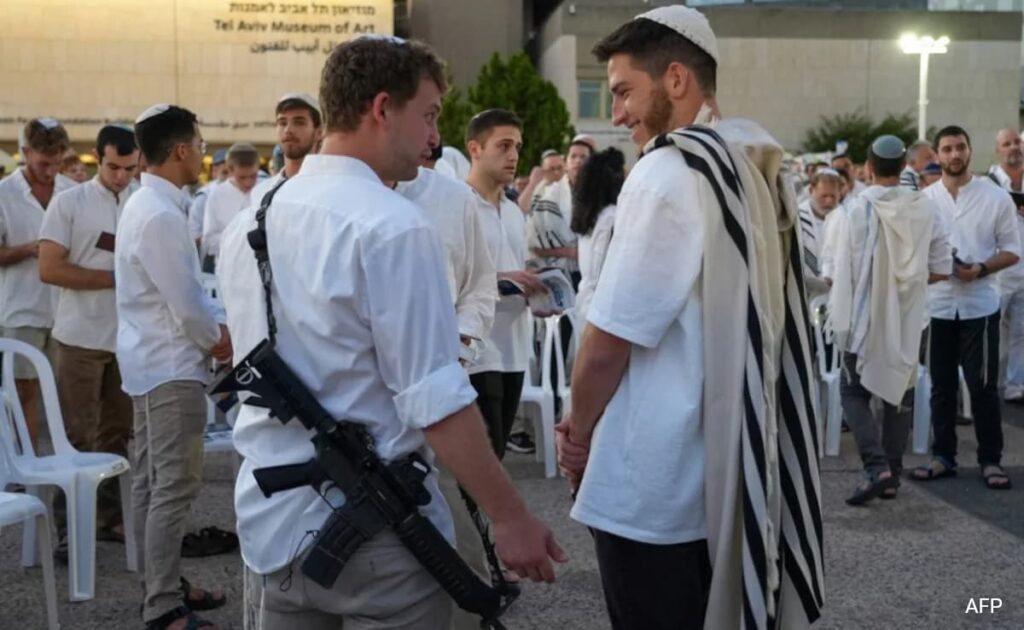New Delhi:
Israel entered Yom Kippur, the holiest day in the Jewish calendar, and the entire country was embroiled in war. The Day of Atonement arrived Friday evening under the shadow of heavy fighting on multiple fronts, marking the first time since 1973 that Israel is at war during the religious festival.
This year’s Yom Kippur celebrations took place amid rocket attacks from Gaza, airstrikes in Lebanon and tensions with Iran. As the sun set and Israelis announced the beginning of the festival, air raid sirens continued to sound across towns and cities. The Israel Defense Forces (IDF) reported that more than 120 rockets were fired into Israeli territory from Gaza, despite the early hours of the holy day. At the same time, Israel continued to retaliate with attacks on Hezbollah strongholds in southern Lebanon.
Read | Blinken says US wants a solution to Lebanon, not a ‘widespread conflict’
IDF military operations in both Gaza and Lebanon have drawn intense international scrutiny, particularly over incidents involving UN peacekeepers stationed in southern Lebanon. On Friday, Israeli forces opened fire on a United Nations Interim Force in Lebanon (UNIFIL) camp, wounding two Sri Lankan peacekeepers. The incident came just a day after two Indonesian peacekeepers were injured in a similar attack. The Israeli army acknowledged the hit but defended its actions, saying its soldiers were responding to an “immediate threat” near UNIFIL positions.
India: ‘concerned’
India has expressed deep concern over the deteriorating security situation in West Asia, particularly the clashes along the UN-recognized Blue Line between Israel and Lebanon.
“We are concerned about the deteriorating security situation along the Blue Line and will continue to closely monitor the situation,” the MEA said in a statement.
Read | US expands sanctions on Iran in response to missile attack on Israel
The United Nations condemned the attack on peacekeepers as a violation of international law, and several world leaders quickly called for accountability. UN Secretary-General António Guterres called the firing on UN positions “unacceptable” and US President Joe Biden called on Israel to end operations targeting UN forces. European leaders, including French President Emmanuel Macron, expressed outrage and called on Israel to respect the sanctity of the United Nations mission.
hezbollah threat
Hezbollah on Friday warned Israeli civilians to stay away from military positions in residential areas in northern Israel. The extremist group accused the Israeli military of using civilian areas as shields for military installations, particularly in major cities such as Haifa, Tiberias and Acre.
Hezbollah fired numerous rockets at Israel as part of broader retaliation for Israeli military operations in Gaza. These continued attacks have resulted in widespread destruction and loss of life in both Lebanon and Israel.
Read | US believes Iran has not decided to build nuclear weapons
The conflict between Hezbollah and Israel, which had been simmering for decades, erupted into full-scale hostilities after Hamas attacked Israel on October 7, 2023. The surprise attack, which killed more than 1,200 Israelis, was the deadliest in Israel’s history and plunged the region into a war that shows no signs of slowing down.
ceasefire attempt
Diplomatic efforts toward a ceasefire have so far been unsuccessful. Lebanese Prime Minister Najib Mikati, who has been bearing the brunt of Israeli airstrikes, called for an immediate end to the fighting and asked the UN Security Council to issue a resolution to this effect. Mikati stressed that only the Lebanese army and UN peacekeepers should be stationed along the border, a proposal that Hezbollah reportedly agreed to in principle.
Read | Israeli army intensifies ground operations in northern Gaza, 3 killed
The United States insists it has worked tirelessly to broker a ceasefire. Amos Hochstein, the US special envoy for the region, said the US was in “nonstop” talks to end the fighting. Despite these diplomatic overtures, fighting continues, with Israeli forces bombing Hezbollah positions in southern and eastern Lebanon, and Hezbollah responding with rocket attacks.



